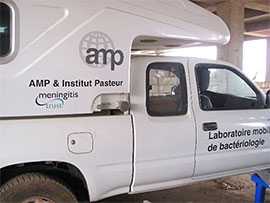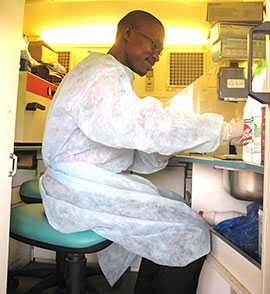Division of Bacterial Diseases (DBD) News Bulletin
Summer 2015
In This Issue
- Exploring Meningococcal Outbreaks & Carriage
- White House Forum on Antibiotic Stewardship
- New EIS Officers & LLS Fellow
- DBD Supports the Ebola Response
- MenAfriNet Partners Respond to Niger Outbreak
- Laboratory & Communications
- Vaccine News & Meetings
- Awards
- Epi-Aids & Outbreak Investigations
- Publication Highlights
MenAfriNet Partners Respond to Serogroup C Neisseria Meningitidis Outbreak in Niger
In March 2015, Niger health officials identified multiple cases of serogroup C meningococcal disease in the Dogon-Doutchi health district. There were enough cases to exceed the outbreak threshold set by the World Health Organization (WHO) in multiple health areas in the district. How would CDC be able to assist the Niger Ministry of Health in responding to this outbreak?
Niger is located within the meningitis belt of sub-Saharan Africa where epidemic meningococcal disease has been pervasive for over 100 years. Prior to a vaccine campaign targeting serogroup A Neisseria meningitidis, approximately four out of every five cases of meningitis in Niger were caused by serogroup A N. meningitidis. "After the MenAfriVac™ serogroup A conjugate meningococcal vaccine was introduced in Niger in 2010–2011, we hoped that these devastating meningitis epidemics would become a thing of the past," commented DBD’s Sarah Meyer.
While meningococcal disease can also be caused by other serogroups of N. meningitidis, large scale epidemics have been less common. "When we heard of this meningitis epidemic due to serogroup C," Meyer continued, "we knew we needed to get on the ground quickly to help the Niger MOH investigate the outbreak and implement control measures."

Photo: The LaboMobil®, provided by Agence de Médicine Preventive during the Niger meningitis outbreak in spring 2015, is an all-terrain vehicle outfitted with a variety of laboratory equipment and its own energy and water source.
With a rising number of cases, the Niger MOH officially declared an outbreak of serogroup C meningococcal disease on April 1, 2015. Two days later, the Niger MOH formally requested assistance from MenAfriNet in investigating and managing the outbreak.
MenAfriNet is a regional meningitis surveillance network established by CDC to evaluate the impact of MenAfriVac™. The Division of Bacterial Diseases (DBD) leads these efforts in partnership with WHO, Agence de Médicine Preventive (AMP), African Ministries of Health, and other institutions with expertise in meningitis surveillance in the African meningitis belt.
"This outbreak took the country and us by surprise," recalls DBD’s Stephanie Schwartz. "Many resources that would have been employed to respond to a meningitis epidemic had been channeled to other priorities in recent years as a result of the success of MenAfriVac™." This outbreak of serogroup C N. meningitidis overwhelmed the local hospitals and laboratories very quickly.

Photo: Oubote Abodji (Agence de Médicine Préventive) working inside the LaboMobil®, performing on-site cultures, gram stains, and biochemical identification tests at Lazaret during April 2015.
As a result, MenAfriNet provided funding for 13 short-term national staff to aid in surge capacity for epidemiologic and laboratory support. Resources were also provided for the permanent national staff to conduct outbreak investigations and provide outbreak response. "We were fortunate to be able to get on the ground quickly to strengthen and add to their capacities in rapid laboratory confirmation," says Schwartz, "including mobilizing the LaboMobil®." The LaboMobil®, which was provided by AMP as a MenAfriNet partner, is an all-terrain vehicle outfitted with a variety of laboratory equipment with its own energy and water sources. The LaboMobil® was stationed at Lazaret treatment center for six weeks during the height of the outbreak, and offered enhanced lab capacity for rapid tests where it was needed most.
The outbreak continued to accelerate throughout the month of April, peaking in May with 2,182 suspected meningitis cases in just one week. The outbreak resulted in 8,500 cases and 573 deaths as of June 30, 2015. Out of the 44 districts in Niger, 13 were affected by the outbreak with the capital district of Niamey suffering the most, with 5,267 cases.
CDC and MenAfriNet technical assistance was extensive with approximately 400 days of person-time in-country during the declared outbreak. Fifteen CDC epidemiologists, data managers, and microbiologists (six from DBD) allowed for continuous CDC and MenAfriNet presence during the outbreak from April 9, 2015 to July 3, 2015.
Top of PageGlobal Health Security
The importance of global health security has never been clearer. New microbes are emerging and spreading, drug resistance is rising, and laboratories around the world could intentionally or unintentionally release dangerous microbes. Globalization of travel and trade increase the chance and speed of these risks spreading. To address these challenges, CDC is joining with other U.S. government agencies and global partners to advance a Global Health Security (GHS) Agenda. The aim of this agenda is to ensure countries have strong capacity to prevent, detect, and respond to infectious disease outbreaks quickly.
Multiple DBD epidemiologists and laboratory scientists are working with GHS countries to consider ways in which CDC can leverage existing infrastructure and relationships within GHS countries to improve surveillance, laboratory, and response capacity. DBD is working closely with the Center for Global Health to establish the GHS platform in various countries; in particular Burkina Faso, where DBD/MVPDB established strong working relationships with the Ministry of Health and infrastructure for bacterial meningitis lab-based surveillance that can help strengthen other surveillance systems.
RBD’s Chris Van Beneden recently completed a several month detail to NCIRD/OD where she helped to establish NCIRD’s role in GHS. And DBD Director, Rana Hajjeh, serves as the technical lead for Burkina Faso, working closely with Rebecca Greco Kone, the country’s new GHS Office Director. Hajjeh said that, "GHS is a huge opportunity for DBD to use its technical capacity in surveillance as well as diagnosis of and response to respiratory outbreaks to support this CDC priority." Learn more about GHS.
- Page last reviewed: September 28, 2015
- Page last updated: September 28, 2015
- Content source:


 ShareCompartir
ShareCompartir